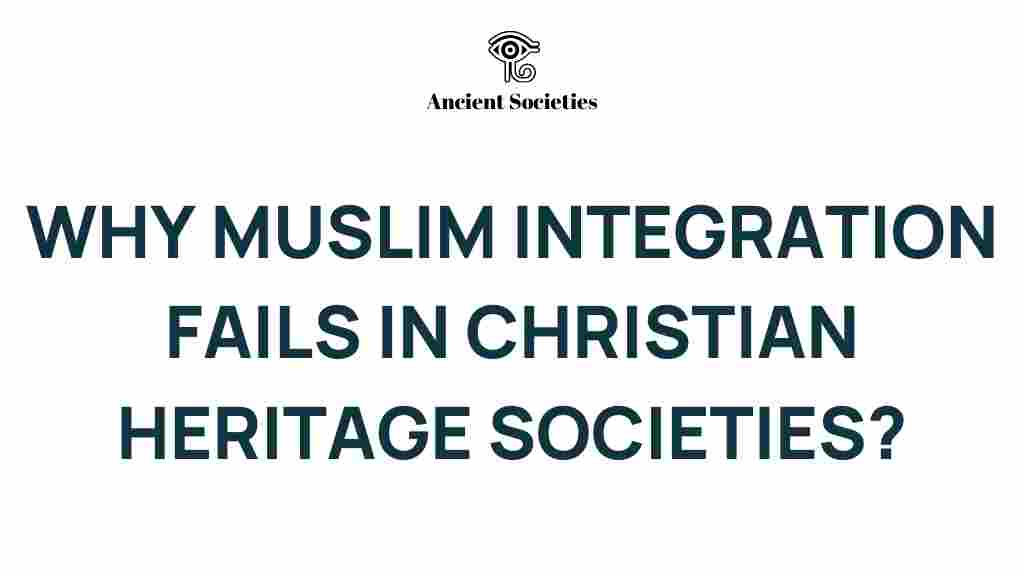The Challenges of Muslim Integration in Christian Heritage Societies
In recent decades, the world has witnessed significant shifts in migration patterns, leading to the presence of diverse Muslim communities in traditionally Christian heritage societies. This phenomenon has sparked important discussions about Muslim integration, cultural dynamics, and the challenges that arise in the context of religious coexistence. As these communities establish themselves, various societal challenges emerge, affecting community relations and the fabric of multiculturalism. This article explores the complexities of Muslim integration in Christian heritage societies, delving into the cultural dynamics at play and offering insights into fostering harmony.
Understanding Muslim Integration
Muslim integration refers to the process through which Muslim immigrants and their descendants become part of the social, cultural, and economic fabric of their new societies. This integration can be seen as a multifaceted issue involving:
- Social acceptance and inclusion
- Cultural exchange and adaptation
- Religious coexistence and understanding
- Economic participation and contribution
However, the journey towards integration is often fraught with challenges that can hinder the establishment of positive community relations.
Cultural Dynamics in Christian Heritage Societies
Christian heritage societies, characterized by their historical and cultural ties to Christianity, may face unique challenges in accommodating Muslim populations. The cultural dynamics involved include:
- Identity Conflicts: The presence of a significant Muslim community can lead to identity conflicts, where both parties struggle to maintain their cultural heritage while adapting to a new social landscape.
- Perceptions and Stereotypes: Misunderstandings and preconceived notions about Islam can foster negative perceptions, leading to social division and mistrust.
- Religious Tensions: Differences in beliefs and practices may result in friction, particularly in communities where religious observance is a central part of social life.
These dynamics can complicate efforts at Muslim integration and require a nuanced approach to address them effectively.
Societal Challenges to Integration
Several societal challenges can impede the successful integration of Muslims into Christian heritage societies:
- Economic Barriers: Limited access to jobs and economic opportunities can restrict Muslim communities, creating feelings of exclusion and resentment.
- Education Gaps: Disparities in educational attainment can affect the ability of Muslim individuals to integrate fully into society.
- Political Climate: Hostile political rhetoric regarding immigration can exacerbate societal tensions and hinder efforts at integration.
- Social Segregation: The formation of enclaves where Muslim communities live separately can perpetuate isolation and hinder cultural exchange.
Addressing these challenges requires collaborative efforts from governments, community organizations, and the societies themselves.
Steps to Foster Successful Integration
To promote successful Muslim integration into Christian heritage societies, several strategies can be employed:
- Community Engagement: Initiatives that encourage dialogue between Muslims and non-Muslims can help break down stereotypes and foster understanding. Programs such as interfaith dialogues and community service projects can be particularly effective.
- Inclusive Policies: Governments should implement inclusive policies that promote equal opportunities for all, regardless of religious background. This includes access to education, employment, and social services.
- Education and Awareness: Educational programs that inform citizens about Islam and Muslim cultures can help dispel myths and promote coexistence. Schools can incorporate multicultural education into their curricula.
- Support Services: Providing support services for immigrants, such as language classes, job training, and legal assistance, can facilitate their integration into the workforce and society.
By adopting these strategies, societies can create a more welcoming environment that fosters religious coexistence and enhances community relations.
Troubleshooting Integration Challenges
Despite best efforts, challenges in Muslim integration may persist. Here are some troubleshooting tips to address common issues:
- Addressing Misinformation: Combat misinformation by providing factual resources and facilitating open discussions that allow for questions and clarifications about Islam and Muslim practices.
- Encouraging Local Leadership: Empower local Muslim leaders to engage with community members and act as liaisons. Their insights can bridge gaps and foster mutual respect.
- Monitoring Social Media: Social media can amplify negative narratives. Monitor online discourse and intervene when harmful content spreads, promoting positive stories of integration instead.
- Promoting Success Stories: Highlight successful integration stories in local media to serve as examples of how multiculturalism can thrive.
By proactively addressing challenges, communities can create pathways for improved community relations.
Conclusion
The integration of Muslim communities into Christian heritage societies presents both challenges and opportunities. While societal challenges such as economic barriers, identity conflicts, and political tensions can hinder the process, adopting inclusive measures and fostering open dialogue can pave the way for successful integration. Emphasizing cultural dynamics and promoting religious coexistence are essential steps in creating societies that celebrate multiculturalism and mutual respect.
For more insights into multicultural integration and community dynamics, check out this resource that offers further reading on the subject. Additionally, if you’re interested in learning more about interfaith initiatives, visit this site for valuable information.
By embracing diversity and maintaining open communication, Christian heritage societies can transform the challenges of Muslim integration into opportunities for enrichment and growth.
This article is in the category Society and created by AncientSocieties Team
